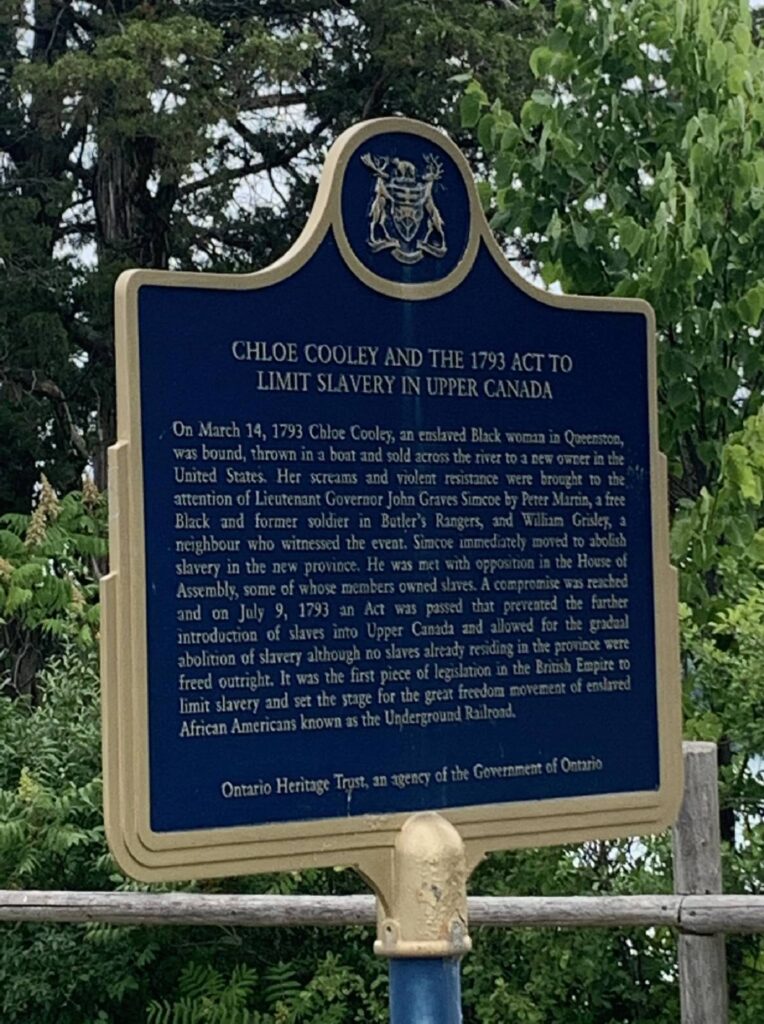Writer: Geoff Butler
Canadian Historical Sites, Memorials, Monuments and Museums
On March 14th, 1793, a young black woman named Chloe Cooley, enslaved in the Niagara region of Upper Canada, was mercilessly “bound and thrown” into a boat by Sergeant Adam Vrooman from Queenston. He was assisted by his brother Issac and one of the United Empire Loyalist McGregory Van Every’s five sons. Cooley was being brought against her will across the river to be sold into the Trans-Atlantic Slave Trade, known as Maafa, in New York State. The term ‘Maafa’ is a Kiswahili word meaning ‘Great Tragedy’ and refers to the 500 years of suffering of people of African heritage through slavery, colonialism, and imperialism.

Chloe Cooley was first enslaved by Benjamin Hardison from present-day Fort Erie and was later sold to Adam Vrooman of Queenston. Vrooman was an American Loyalist who had come to Upper Canada after the American Revolution. Many recently arrived Loyalists brought their servants and slaves with them. Chloe worked at Vrooman’s residence as a domestic servant, along with another slave named Tom, taking care of his five children and all of the household chores.
At the time, there was a lot of talk about Governor John Graves Simcoe moving forward with legislation making it “illegal for anyone coming into the country to enslave others and ruled that anyone currently enslaved, born to a mother who was enslaved would be freed at the age of 25.” In turn, Vrooman, fearing this potential financial and property loss, decided to sell Cooley in the United States, where it was legal.
Thus on March 14th, 1793, he tied her up and forced her into a boat, rowing her across the Niagara River. She apparently resisted with all her might, screaming and struggling to get away throughout her journey. However, upon reaching the American side of the river, she was sold to a new “enslaver” and was never seen or heard from again.
A witness to the incident, Peter Martin (a free Black and former soldier of John Butler), along with another witness, William Grisley (a white man who worked as a labourer for Vrooman), reported the horrific incident to Lieutenant-Governor Simcoe and the Executive Council. Martin reported, “violent outrage committed by one (Vrooman)…residing near Queens Town…on the person of Chloe Cooley, a Negro girl in his service, by binding her, and violently and forcibly transporting her across the (Niagara) River and delivering her against her will to persons unknown.”

Upon hearing of the incident and Cooley’s resistance, Governor Simcoe immediately moved to abolish slavery in Upper Canada and called for Vrooman’s arrest. Vrooman petitioned the charges, and unfortunately, the charges were dropped as Chloe Cooley had no rights and was considered a ‘piece of property.’ Outraged, Simcoe moved forward with legislation, the Slave Act of 1793. However, 16 members of the House of Assembly were slaveholders and opposed the Act, so a compromise had to be reached.
In July 1793 an Act was passed, “An Act to Prevent the further Introduction of Slaves and to limit the Term of Contracts for Servitude within this Province.” Although this Act did not release existing slaves, it prevented importation and freed the future children of slaves at age 25. This law made Upper Canada the first British colony to move towards abolishing slavery. The Act remained in place until 1833 when the British Parliament finally abolished slavery in most parts of the British Empire with the ‘Slavery Abolition Act.’
The Chloe Cooley incident was instrumental in the passage of Canada’s first anti-slavery legislation, the Act to Limit Slavery. She is recognized as a person of National Historic Significance under the National Program of Historical Commemoration in 2022.
Sources:
Chloe Cooley-Canadianencyclopedia.ca
Chloe Cooley-Wikipedia
Tragic Story of Chloe Cooley-Kentake Page
Chloe Cooley-pc.gc.ca
Chloe Cooley-Historicacanada.ca
Chloe Cooley-heritage trust.on.ca
1793 Act to Limit Slavery-Canadianencyclopedia.ca
Act against Slavery-Wikipedia
Act of 1793-pc.gc.ca
Chloe Cooley-Huronresearch.ca




